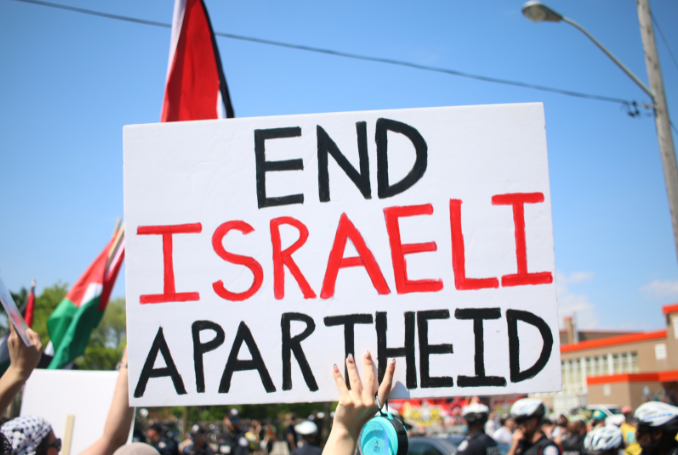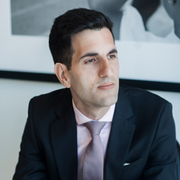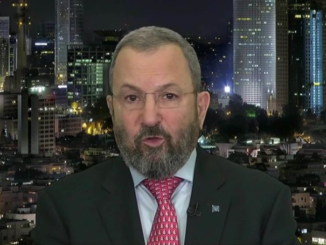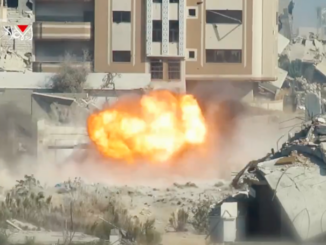
Recently I organized a demonstration outside a Toronto theatre. It was to protest the screening of a dishonest documentary—First to Stand: The Cases and Causes of Irwin Cotler—taking place inside.
The documentary is on former Minister of Justice and Attorney General of Canada, professor and lawyer Irwin Cotler. He also denies the Nakba—the catastrophe of 1948 when at least 800,000 and 15,000 Palestinians were, respectively, displaced and killed by Israeli forces to make way for the state of Israel. The film however presents Cotler as a human rights “hero”, which no Nakba denier can be.
Admittedly all documentaries have a degree of bias in them in that they portray individuals, states of affairs, etc. from a particular point of view, often the filmmaker who, say, wants to convey a certain social or political message. However, First to Stand does more than this. It misleads the public by keeping outside the frame any substantive discussion or critique about Cotler’s denialism.
That’s a major part of who Colter is. For years he’s been promoting the view that the Nakba, as understood by historians the world over and formally acknowledged by a United Nations resolution last year, is effectively a fiction.
In doing so, he Is part of a larger global subculture, if you will, of racists, that either seek to downplay the severity of the Nakba or, like Cotler, erase it as a historical fact. In turn, they, deplorably, trivialize the legacy of Palestinian suffering and trauma caused by the Nakba itself, which—as we see on social media daily—is ongoing through Israel’s violent ethnic cleansing against Palestine, carried out with impunity (e.g. Israel not being sanctioned by Western powers).
Whether it manifests itself in the bombing of Gaza, random killings of unarmed Palestinian civilians, illegal evictions of Palestinians from their homes in the West Bank (to build more Israeli settlements that contravene international law), such cleansing is inextricably connected to the Nakba. For the Nakba is coextensive with the founding of Israel which, ever since, has been a state that was founded on and continues to expand by destroying Palestinian life. Israel would simply not be where it is today without that destruction.
At recent Toronto launch of film about @IrwinCotler attendees deny existence of Palestinians & react angrily to protesters calling him a human rights “fraud” pic.twitter.com/jBArAYDvQ7
— Yves Engler (@EnglerYves) February 7, 2023
This all went into my thinking as I independently organized the demonstration. The event was not sponsored or part of any formal organization. I mostly did the organizing online and when it was thought, at first, that Cotler would be in attendance there seemed to be quite a bit of enthusiasm among possible demonstration attendees. Many of us, at the time, were moved by the idea of contesting Colter, non-violently and face-to-face in the theatre. But as it turned out (and was advertised) he would only be at the screening virtually.
When this came to light the enthusiasm dropped. This was admittedly discouraging; I wasn’t sure if it was worth organizing any demonstration at all. I felt I might be the only one to show at it—a lone person standing outside the theatre with a sign protesting Cotler.
The thought of that changed everything. I asked myself why not do that. Why does a demonstration have to be big? Loud? A crowd? Why can’t a demonstration, however great the injustice it opposes, not be comprised of one individual? What ultimately matters, it seemed to me, is that a demonstration conveys a clear message, such as that First to Stand is a dishonest film.
I also thought that I had a duty to protest the documentary, as an ally to the Palestinian people who could not be outside the theatre (living in another continent and, in the case of Gaza more specifically, under illegal blockade) at the time of the demonstration. Accordingly, the duty, as I conceived of it, would consist of me being a voice in solidarity with the Palestinian people, not for them, where they were physically absent. Whether I’d get much of a rise from any single passerby (and there turned out to be many) was irrelevant. Central to my thinking was that the documentary, whatever merit it had, is whitewashing the anti-Palestinianism of Cotler and by extension the current Canadian government where he enjoys the prestigious post of Special Envoy on Preserving Holocaust Remembrance and Combatting Antisemitism.
Moreover, I didn’t want the documentary to be screened and people—entering the theatre, passing by it, etc.—not know this was happening. If I could get them to think about that or, better, engage in conversation with them so that eventually they might join the larger struggle for Palestinian justice, I believed that would be a tiny but meaningful victory. And so in a similar spirit to what St. Therese of Lisieux and later Dorothy Day referred to as the “little way”, while strengthened by love for the Palestinian people, I resolved to do so while holding up a simple sign. Made with only a black marker it read: “IRWIN COTLER IS A NAKBA DENIER.”
I announced my plan to others in the WhatsApp group where I was doing part of the organizing. I also invited any who wanted to join me to do so. My tone was cordial. I did not want anyone to feel they had to or feel bad if they couldn’t. Additionally, I wanted to clarify for any who anticipated something bigger that the demonstration might very well just be me. I didn’t want people to attend it thinking they had in any way been misled to believe they would be part of a sizeable, animated crowd—though any non-violent action for Palestine, whatever the scale, is in my view both necessary and worthwhile.
As the video of this article shows and to my pleasant surprise about 10 fellow Palestinian allies showed also protest the dishonesty of the film. They were of different faiths, ethnicities, etc. with one thing in common—their love for the Palestinian people and unwavering commitment to justice for Palestine itself.
Some I knew already, others the honor of meeting the first time. It was an emotional experience for me. It confirmed there were others who believed enough in my small act of standing alone, in solidarity with Palestine, to join me and ultimately turn the act into a group event.
We held signs, distributed a flyer about Cotler’s anti-Palestinianism, chanted loudly pro-Palestinian messages and others that challenged the legitimacy of Cotler—in contrast to the documentary—as a beacon for human rights. As we did so people, many of whom were entering the theatre, passed by us. Some were curious to know more about our message. We engaged them in constructive dialogue, as I had hoped.
Others mocked and yelled at us, not unlike at the pro-Palestinian demonstration I attended in Toronto last December and wrote about. Like at that demonstration, we were at times met with anti-Palestinian animus. At least two people told us that there was no Palestine, echoing the false and racist position of Toronto groups such as the Canadian Education Antisemitism Foundation (CAEF) that does the same and held an event last November where Cotler was a featured guest.
Not only did the demonstration allow us to contest the documentary it also brought out the anti-Palestinianism that still exists in Toronto. I’ve brought this to the attention of several local and federal elected officials, including recently resigned Mayor John Tory, inviting them to work with those concerned about both the safety of Palestinians in Toronto and justice for Palestine more broadly. None have replied.
On a positive note, the demonstration was a success. It challenged people to think about who Cotler really is and, in turn, how anti-Palestinianism in Canada and elsewhere is not being taken seriously. I’m also encouraged by, looking back, how it doesn’t take much to hold a demonstration as we did. It can begin with one person saying I’ll be at a certain place and time to protest an injustice, be it against Palestine or otherwise. If others see your sincerity, that you’re not doing it to be “cool” or get likes on social media, they will join you. Even if they don’t you can still demonstrate alone.
That requires the mustering of at least some courage, the inspiration for which can be drawn from the Palestinian people themselves. Risking their lives they fight daily against Israeli military might, far exceeding their defense resources and capacity. If they can do that surely we, in safer and more privileged parts of the world, can demonstrate against anti-Palestinianism—however large or small we are in number—in public.
That has more impact than posting about Palestine online. It tells people you are serious about Palestine and you are not afraid to fight for it in the proximity of random strangers, who you can’t just scroll over like on a computer screen. This will surely upset some but, more importantly, mobilize others.
Among those strangers are those who want justice for Palestine too. If it means holding a sign in front of a theatre, let them know they can join that struggle with you.
There’s no reason to hide from that struggle if it’s in your heart to partake in it. There’s an international family of pro-Palestinian brothers and sisters waiting for you. And unlike First to Stand we do not hide the truth.
We are not afraid to say that the Nakba is ongoing and it’s high time it ends.

– Paul Salvatori is a Toronto-based journalist, community worker and artist. Much of his work on Palestine involves public education, such as through his recently created interview series, “Palestine in Perspective” (The Dark Room Podcast), where he speaks with writers, scholars and activists. He contributed this article to The Palestine Chronicle.








